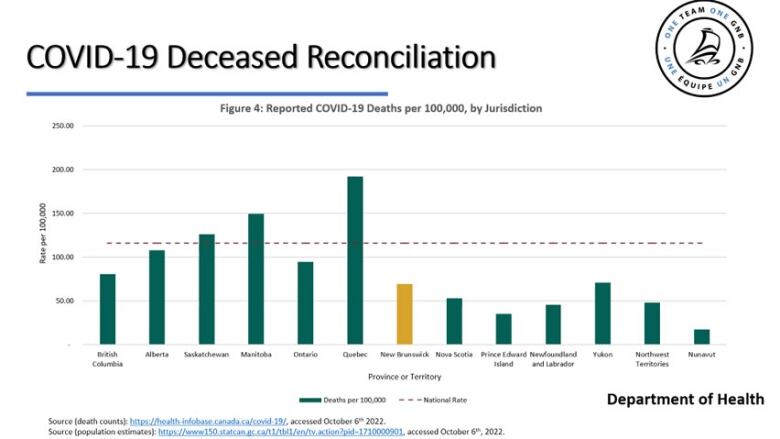N.B. death toll from COVID-19 jumps by 79 after epidemiological review
'Reconciliation exercise' after changed definition last March raises pandemic death toll to 572

Seventy-nine more New Brunswickers have died from COVID-19 than previously reported, the province announced Friday.
Public Health detected the discrepancy during a review ofall COVID-relateddeathssince thebeginning of the pandemic,Mathieu Chalifoux, the province's chief epidemiologist,told reporters during a technical briefing.
Itfound 125 deaths between March 1, 2020, and May 31, 2022,should be added to death toll, and 46 previously reported COVID-related deaths should be removed.
"Counts during the Omicron wave did not accurately reflect the situation as it unfolded," he said.
Public Health has no plans to notify the families whose loved one's death was reclassified, according to Chalifoux.
"We do expect that the families would have been told based on the attending physician or the usual mechanisms by which someone would be notified," he said.
The new deaths raise the province's pandemic death toll to 572, and the latest COVIDWatch report has been updated to reflect the change.

New Brunswick has the highest death rate per 100,000 among the Atlantic provinces,the revised figures show, but remains among the lowest in the country,said Chalifoux, noting not all jurisdictions report deaths in the same manner.
The province is confident in its new figures, following this "reconciliation exercise one of the first of its kind in Canada," he said.
Public Health conductedthereview, he said, to understand what impact changing itsdefinition of COVID-19 deaths last winter had, and "also to best inform New Brunswickers of the breadth of the impact that COVID-19 has had in [the] province."
In March 2022, Public Health began reporting COVID-relateddeaths as those where thevirus waseithertheprimary cause of death or adirectly contributing factor.
Previously, the province used thenational surveillance case definitionfor a deceased COVID-19 case: a probable or confirmed COVID-19 case whose death resulted from a clinically compatible illness, unless a clear alternative cause of death is identified, such as trauma, poisoning, or drug overdose.
Each death was alsoreviewed by regional Public Health officials to determine if itmet the case definition.
The change was in response to the increased volume of cases associated with the Omicron variant and Public Health's modified case and contact management strategy to concentrate on vulnerable populations and settings, Chalifouxsaid duringthe briefing, held via Zoom.

Public Healthbegan theretrospective analysis in June, reviewing each death registration form to reconcile the data with the updated definition.
The death formsessentially split cause of death into one of two parts,said Chalifoux. Acondition or disease such asCOVID-19 is listed either in part oneas a primary or antecedent, meaning it led directly to the death,or in part two, which is "other diseases noted at the time of death."
Deaths were added or removed from the count accordingly.
No single source was identified as the main contributor to the discrepancy, saidChalifoux.
"We missed these deathsin all the sectors, in all the regions and all age groups. It was not a systemic problem unique to one location."
Moncton sees biggest jump
The largest differencewasin the Moncton region, Zone 1(+33 deaths), and among individuals aged 60 and older (+78), specifically, those aged 90 and older (+32),the COVID-19 Deceased Reconciliation report shows.
Of the125 deaths that wereadded to the total count, 53 per centoccurred in a hospital and 39 per centoccurred in a nursing home, the report states.
Most of the revisions were required betweenFebruary and May 2022.
"This reflects in part the large volume of activity observed during the Omicron wave as Public HealthNew Brunswick modified its approach to case and contact management towards mitigating the impacts to our vulnerable sectors," Chalifoux said.
In January and February, some deaths were registered without a PCR(polymerase chain reaction) lab test, he added.

There were "minimal changes"during 2020 and 2021. "This suggests that our count during this period were accurate and reflective of the COVID-19 activity at the time."
Asked what assurances Public Health can offer that its numbers going forward will be accurate, ChalifouxnotedNew Brunswick is not the first jurisdiction to make such an adjustment.
"We recognize no surveillance system is perfect, but we're very confident in the changes to the process that have been put forward as a result of this," he said. That includes sharing information directly with the Vital Statistics branch of Service New Brunswick.
Data from June 1 onwards is not expected to require any revisions, he added.
The death reviewis separate from Statistics Canada's excess death analysis report, which was based on data submitted by New Brunswick Vital Statistics, said Dr. Yves Lger, the province'sacting chief medical officer of health.
The province's revised death count does not affect the Statistics Canada analysis, he said.
Health officials anticipate an increase in COVID activity this fall and winter, along with increased flu activity.
Three more New Brunswickers died from COVID-19 in the past week, according to the latest COVIDWatch report, released Wednesday.
There are 27 people hospitalized because of COVID, as of Saturday, including three in intensive care, according to the province.
Meanwhile, the two regional health authorities, which include in their weekly reports people admitted to hospital because of COVID-19 as well as those initially admitted for another reason and later test positive for the virus, say there are 113 COVID-19 patients hospitalized, seven of whom require intensive care.
A total of 1,161 new cases of COVID-19 were reported between Oct. 2 and Oct. 8. That includes 631 confirmed through a PCR (polymerase chain reaction) lab test and 530 people who self-reported testing positive on a rapid test.
There are now 843 active cases of COVID across the province, based on PCR-confirmed cases alone.












_(720p).jpg)


 OFFICIAL HD MUSIC VIDEO.jpg)
.jpg)



























































































